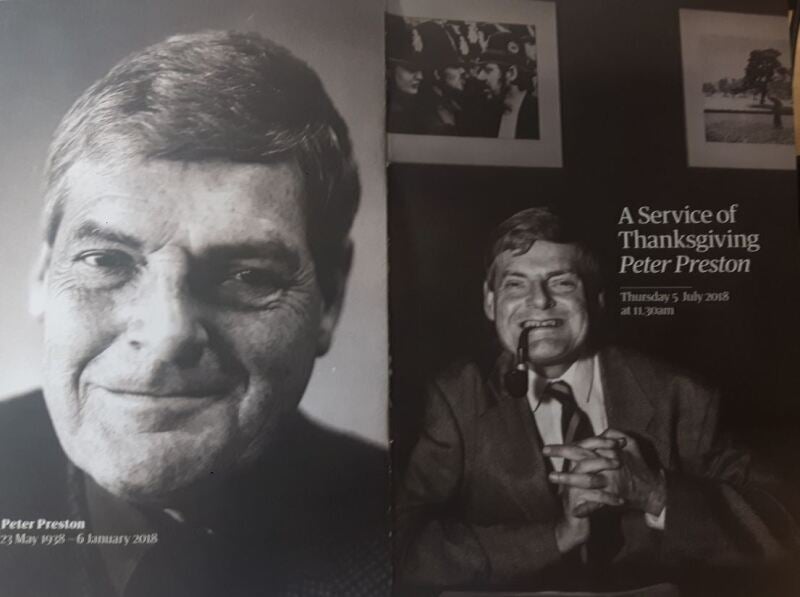
Daily Mail editor Paul Dacre delivered a sermon of praise to The Guardian today – or more particularly to the newspaper under former editor Peter Preston.
Dacre was speaking at a memorial service for Preston, who died six months ago aged 79, which was held today at the journalists’ church of St Bride’s on Fleet Street.
He addressed a packed congregation which included a host of serving and former Fleet Street editors as well as Preston’s four children and eight grandchildren.
Preston was editor of The Guardian from 1975 to 1995 and is credited with modernising it, putting it on a firm financial footing and transforming its journalistic reputation.
Dacre has previously been scathing in his criticism of The Guardian.
But today he confessed his admiration for the paper under Preston, even going as far as to say that Preston would have made a great editor of the Daily Mail.
Dacre, who retires as editor of the Daily Mail in November, also spoke movingly of the “magical symbiosis of newsprint, pictures, headlines, fonts and beautiful words that at their best can make a paper a functioning part of society rather than a commentary at its edges”.
And he added: “Sadly, those Fleet Street skills needed for that magic symbiosis are dying in an internet age which seems to have a voracious need for free, somewhat crudely expressed, round-the-clock information and gratification.”
Dacre, 69, concluded by saying: “Yes, of course, journalism will survive and may, one day, flourish again. But it will be different.
“Whether it will, in future, have the creative beauty and sheer power of Peter’s Guardian, I don’t know. But I do know – and there’s no presumption here – that, for the sake of our industry’s collective memory, we should today salute a very great man of print.”
There was also an address by Dame Liz Forgan, former chair of the Guardian-owning Scott Trust, and by Preston’s sons Ben and Rupert.
Maggie O’Kane read out a written tribute from Sir Harry Evans who praised Preston for founding the European Press Prize.

Read Paul Dacre’s St Bride’s Tribute to Peter Preston in full:
“I have a confession to make: I cannot claim to have known Peter Preston well. Not one for chit-chat myself, our few social encounters invariably left me drowning in the sea of those famous unnerving silences while my not infrequent mentions in his column were a mix of good, bad and, I suspect, deliberately elliptical.
“That said, Peter was a hero of mine. I always felt – and here you must forgive my presumption – that in his love of… his obsession with… his addiction to journalism – we were kindred spirits.
“As a young reporter on the Express when its circulation was about four million, I would sometimes have a late dinner at that Greek greasy spoon called The Kolossi Grill, known as the Colostomy, in the hope of catching sight of him.
“He was, after all, the journalists’ journalist. The editors’ editor.
“Liz has described Peter the private, shy, socially gauche individual who eschewed the swanky parties and glitzy first nights at which too many of his trade loved to be seen hobnobbing with the powerful and the celebrated.
“I see a different man. I see a slightly lonely figure – one who was all too acutely aware that an editor, who operates without fear or favour, can’t really have friends.
“And then again, good editors need to be outsiders because, let’s be honest, most people only befriend journalists to get something into a paper or – more pertinently – keep it out.
“I also see a man who, even after the first edition had gone, was glued to the back bench, a microwaved pizza and plastic bottle of plonk on his desk.
“This was not because he was against gossiping in the pub but because, frankly, even after a 12-hour day, it was a wretched distraction from a job that had to be done.
“Like sharpening a headline, writing a cleverer intro, or cropping a more dramatic picture, because, let me tell you, when you’re fixated by journalism like Peter was, there’s virtually nothing more important in life than trying to produce the perfect paper. And, on the rare occasions that you do, there’s no greater buzz on this earth.
“Now I am not going to provoke my own lynching by suggesting that I’d have made a good fist of editing The Guardian.
“But I am going to risk a collective cardiac arrest in this congregation by offering you the view – that politics apart, and actually, with the exception of his passion for Europe, I don’t think Peter was ideological – it’s not fanciful to say the man would have made a great editor of the Daily Mail.
“After all, he came from the lower middle class. He was instinctively anti-establishment. Politically he was difficult to define, though on the unions he was almost Thatcherite.
“He believed, to the deprecation of too many of his colleagues to whom profit is a dirty word, that it was actually rather a good thing for a paper to be financially prudent and commercially successful.
“He was evangelical about the need for what he called ‘zing’. His mantra was ‘serious doesn’t need to be dull’. He initiated great women’s pages. In G2 he created a brilliant tabloid that has been imitated but never equalled.
“He was fascinated by popular culture and determined Guardian readers should not be excluded from the national dialogue because some of his staff had an aversion to anything that interested ordinary people.
“And his philosophy, outlined in his last media column, that readers in a jam should be treated like human beings and that a paper, by identifying with distress, becomes a functioning part of society rather than a commentary on its edges – should be the credo of every editor.
“Above all, he loved features and beautiful words and brilliant writers, several of whom the Mail poached. Others were rogues whom he tolerated because of the glory of their writing. To others he gave whopping pay increases – at least whopping by Guardian standards – to stop them defecting to rivals.
“And the making flesh of those wonderful words and a manifestation of Peter’s genius for lateral innovation was G2. Why he asked – if it effervesced with flair, wit and creativity – should a tabloid be downmarket.
“Inevitably, there were the quali-pop sneers. Jonathan Miller, in self-condemnatory words, called Pass Notes a pollutant infecting culture.
“But G2 had it all… jaw-dropping covers… a dizzying range of views and voices… bold pictures… important investigations and profiles… G2 was both serious and salacious even if there were, for my taste, a tad too many articles intellectualising the female orgasm. And not a week went by when, at its height, the Mail didn’t buy one of its articles.
“Now I don’t want to overstate this ‘zing’ factor because ultimately Peter’s Guardian was a very serious newspaper that broke important stories and pulled off some historic investigations.
“He put together a superb stable of reporters, writers and often extraordinarily courageous foreign correspondents. His specialists, particularly in Westminster, Whitehall, the City and Sport, broke an embarrassment of exclusives as I knew to my cost when news editing the Mail in the ’80s.
“He also, in masterminding the paper’s journey from narrow socialism to broad liberalism, created a unique tone in which writers with many different voices, left and right, co-existed, but then Peter’s paper had a compassion, a burning desire to confront social wrongs, a reasonableness and a tolerance that eschewed dogma.
“Others have rightly said that by seeing off the malicious militancy of the unions and launching those highly profitable classified supplements, Peter arguably saved The Guardian from oblivion.
“But ultimately, it was G2 and his daring redesign of the main paper – with its emphasis on creative white – which were hugely significant in the transformation of a somewhat austere high-brow regional paper that haemorrhaged losses into a radical, young, modern, profitable respected global liberal media brand that saw off the ferocious predatory price cutting of The Times, routed the incursions of The Independent and achieved, at its height, a Guardian circulation of 500,000.
“That remarkable legacy prompts me to risk another presumption. I don’t know Peter’s wife, Jean, though she wrote an enchanting letter asking me to give this address. But I do know there are two sides to workaholism.
“There are the insane, grinding, attritional hours that, yes, produce great front pages. And there is the empty seat in the theatre, the querulous exhausted weekends, the nagging anxious need to be near a telephone on holidays, and the absent father at the family dinner table.
“Which is why I can say with absolute certainty, that Peter could not have achieved everything he did on the Guardian and brought up four remarkable children without Jean.
“I am told, in later years, he was, rightly, proud of the Guardian’s online achievements. Whether he was ever reconciled to the digital revolution though, I doubt.
“The reason, of course, was that he was quite simply, a print man. He loved that magical symbiosis of newsprint, pictures, headlines, fonts and beautiful words that at their best can make a paper a functioning part of society rather than a commentary at its edges.
“Inevitably, sadly, those Fleet Street skills needed for that magic symbiosis are dying in an internet age which seems to have a voracious need for free, somewhat crudely expressed, round-the-clock information and gratification.
“Yes, of course, journalism will survive and may, one day, flourish again. But it will be different. Whether it will, in future, have the creative beauty and sheer power of Peter’s Guardian, I don’t know.
“But I do know – and there’s no presumption here – that, for the sake of our industry’s collective memory, we should today salute a very great man of print.”
Email pged@pressgazette.co.uk to point out mistakes, provide story tips or send in a letter for publication on our "Letters Page" blog

